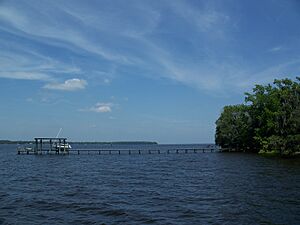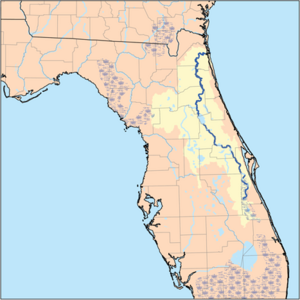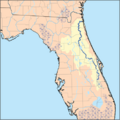Francis Levett facts for kids
Francis Levett was an English businessman who moved to East Florida in 1769. He had worked as a business agent in Italy for a company called the Levant Company. His brother-in-law, Patrick Tonyn, became the governor of the English colony of East Florida.
Levett used his many business and family connections to build one of the first large farms, called plantations, in Florida. But when the English lost control of Florida, he had to leave. He moved to the British colony in the Bahamas. Later, his son returned to America. His son, or more accurately, the enslaved people he owned, were among the first to plant a special type of cotton called Sea Island cotton in America.
Contents
Early Life and Moving to Florida
Francis Levett was born in the Ottoman Empire. His father was a tobacco merchant. Francis came from a family of powerful English traders. These traders helped build the huge British Empire by buying and selling many different goods, like tobacco, indigo, and fabrics.
After working abroad for many years, Levett returned to London. He inherited money from an uncle and decided to move to the British colony in East Florida. He planned to start a new life there.
Building a Plantation
Levett's connections helped him a lot in Florida. He became an agent for a powerful nobleman, John Perceval, 2nd Earl of Egmont, to manage his lands. Levett was also made a judge for the new colony. He received large areas of land, thanks to his friend Richard Oswald and his brother-in-law, Governor Tonyn.
Levett built his Julianton Plantation on the St. Johns River. It was a huge farm, about 10,000-acre (40 km2) in size.
The plantation showed what a wealthy English businessman could create in a new colony. It had fields for growing indigo, corn, potatoes, and peas. There were also rice fields with special dams and dikes to control the water.
The main part of Levett's plantation was his home and surrounding buildings. It included a vineyard with 3,000 grapevines and two beautiful gardens facing the St. Johns River. There were 50 farm buildings, including cabins for enslaved people, kitchens, and barns. Enslaved people also built a network of bridges, roads, and pathways.
The main house was a large, two-story building, 60 feet (18 m)-by-36 feet (11 m), with seven rooms on each floor. It was considered the finest home in British East Florida. It even had a 180-foot (55 m) wharf for ships to dock. Horses and goats grazed in the nearby fields. Levett also earned money by managing plantations for other wealthy English landowners who lived far away.
Challenges for Levett
Even with his powerful connections, Francis Levett faced problems. He was accused of financial wrongdoing. Some people claimed he bought enslaved people for one of his clients but then kept them for his own plantation. A clergyman named John Forbes wrote letters to Governor James Grant, saying Levett was misusing funds.
Forbes wrote that Levett was "charged with purchasing Negroes on Ashby's account and claiming them as his own, with employing Ashby's Negroes at his (own) work, with carrying boatloads of corn from Ashby's place to his (Julianton) settlement without giving credit for them, and with many such extraordinary and unjust transactions."
Levett was very upset by these accusations. He even left Florida for a short time. His son-in-law, Dr. David Yeats, helped him by posting bail. By 1774, Levett returned to East Florida but resigned from the Royal Council. He felt he could no longer be effective because of the controversy.
A few months later, Levett's brother-in-law, Patrick Tonyn, became the new Governor. He helped Levett resolve his financial issues. Francis Levett died shortly after. His son, Francis Levett Jr., took over the Julianton plantation. The plantation did very well during the American Revolutionary War because there was a high demand for Florida turpentine.
After the Revolutionary War, about 13,000 people who supported the British (called Loyalists) moved to East Florida. But their safety didn't last long. In 1784, the British had to give Florida back to Spain.
The Spanish government had different rules. They were not friendly to British Protestants. They wanted people to convert to Catholicism. If British planters did not convert, they could lose their land. Also, the Spanish ended the British system of local government.
Because of these harsh conditions, English planters like Francis Levett Jr. had to leave quickly. They were very sad. Levett's son-in-law, Yeats, wrote to his friend James Grant, "I am totally ruined and see nothing but want and misery before me."
Leaving Florida and Later Years
After the Treaty of Paris was signed in 1783, Francis Levett Jr. had to move all his belongings, including 100 enslaved people, to the Bahamas very quickly. Much of his family's wealth had to be left behind because his ship was too small.
The Levett family was never able to sell their properties in East Florida. The beautiful English manor house and farms were abandoned. Francis Levett Jr. tried to start a new plantation in the Bahamas, but it didn't work out. He had to return to London.
However, he and his wife, Charlotte Box, still wanted to live in America. They later moved to Georgia. There, with help from his father's old friend Henry Laurens, Francis Levett Jr. started a new plantation. He named it Julianton, in honor of his father's abandoned Florida plantation and his mother Julia.
Levett Jr. became one of the first planters in America to grow Sea Island cotton. He knew a lot about this crop from his time in Izmir. There was a big demand for cotton after the Haitian Revolution and the end of slavery on that cotton-producing island. The 1790s were a great time for cotton in South Carolina. Exports grew from 10,000 pounds in 1790 to 6.4 million in 1800. Francis Levett Jr. died in 1802, leaving his new Julianton Plantation to his wife.
Images for kids
 | Misty Copeland |
 | Raven Wilkinson |
 | Debra Austin |
 | Aesha Ash |





